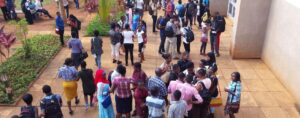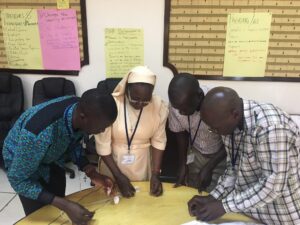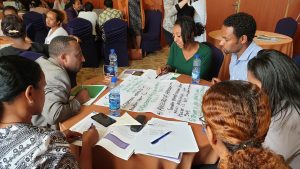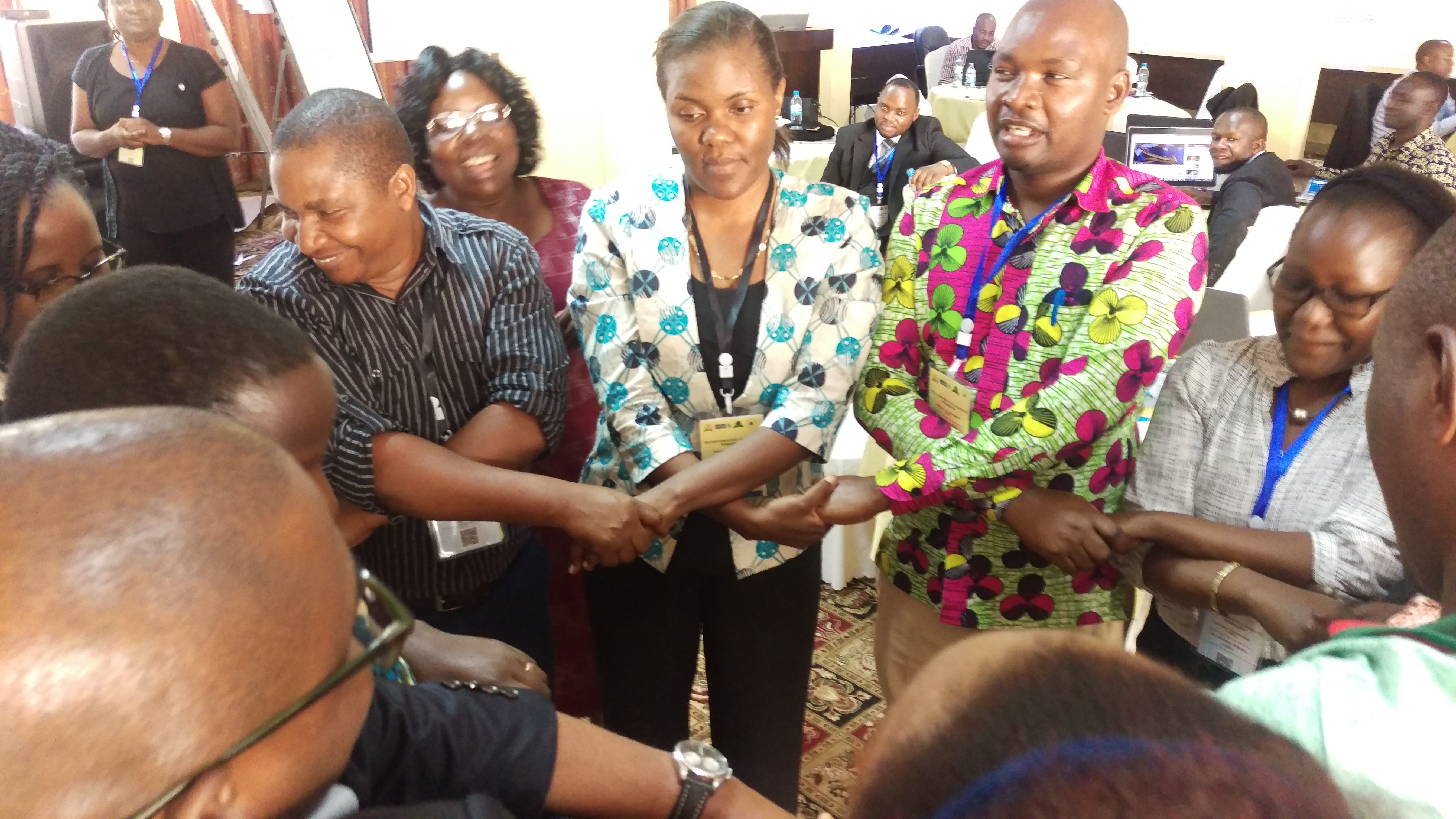
Transforming teachers for transformed students
Through the TESCEA project, four universities in Tanzania and Uganda are working to improve the employability of their graduates by looking at ways to embed the development of critical-thinking and problem-solving skills into courses and in wider university approaches.
For this to be effective, teaching staff need to engage with the process. A key early part of the TESCEA project was a series of transformative learning workshops for the four institutions. These workshops helped teaching staff reflect on their approaches to teaching and how they can help students interact with what they are being taught. We spoke to faculty members from the University of Dodoma about the workshop in Tanzania and the impact it is expected to have on transforming teachers in the university.
In East Africa there is often a disconnect between university teaching and the needs of employers and wider society, as Dr Alex Shayo, Acting Director of Quality Assurance at the University of Dodoma, explains:
“The intention of the education we offer is to ensure that it is giving solutions to what is happening in society. Currently we are facing a huge unemployment rate [in Tanzania]. Partly the way the curricula are structured is a challenge because they’re so traditional they are not thinking correctly for the market demand. And because of that you can have graduates who cannot get employment.”
Over recent months, as part of the TESCEA project, a series of workshops in Uganda and Tanzania have been helping faculty members reflect on their own teaching and learning approaches, in advance of curriculum redesign in selected courses. The workshop in Tanzania, which was held in September, brought together 43 participants from Mzumbe University and the University of Dodoma, with, between them, a total of 524 years’ experience in university teaching. Through discussions, practical activities and reflection time, participants considered how they could transform their teaching to better address this challenge.
One of the participants describes the process:
“We’ve been learning more about how we can change from our old style of teaching to the new mode or style which is very interactive, changing towards the point where the students are problem-oriented. Students are not empty vessels; they have a lot in their minds, they have their assumptions, they have their imaginations. When you give them the opportunity to interact, to share what they have, they will learn howto solve problems themselves.”
These workshops particularly targeted teaching staff involved in the courses selected for review within TESCEA. As Dr Rehema Kilonzo, who is one of the TESCEA leads at the University of Dodoma, explains about the participants from her university:
“We are starting with courses from three programmes at the University of Dodoma so this group has head of departments and instructors who will be teaching the selected courses. This is very important because these are the people that we will work with during the course design and they will be the people who will deliver the courses. It is very important that they attended this workshop so that we can all learn how we are going to change from business as usual to a transformative way of doing things.”
Reflecting on personal approaches to teaching
Participants in these workshops are excited about the potential impact of taking transformative learning approaches, reflecting on their own teaching styles.
“I enjoyed [the workshop] because we used to teach in a certain way that is not really helping the students uncover their potential and abilities. In this workshop I realized some things which were missing like making students think critically and find appropriate solutions in a solving their problems,” says Mshindi Andrew, who teaches management,leadership and innovation courses at the university. “I want every student to feel that he or she is a part of their learning process.”
Another participant has similar reflections:
“I started to analyse myself: if what I’ve been doing was good and successful to my students, did I manage to create creative students who are free to express themselves and to work in different kinds of environment? I realized that I tried to do this to some extent but also to some extent I was trying to fix them in the way I wanted. This training changed my mind and now I have to find ways of enabling students to participate, interact and give their ideas. As a teacher you don’t know everything.”
External and internal challenges
However, there are some external challenges: historical, environmental and with the system, as this participant notes.
“The education system in Tanzania and elsewhere in Africa – from primary school, secondary school to the highest level – is focused on teachers giving information to students. When they come to the university they say: ‘oh teacher, give us the notes and we’re going to learn them and pass the exams’. Our classes are also designed to foster that kind of arrangement, as are the teaching and learning facilities. Another challenge is the system itself – policies, curriculum and protocols.”
Beyond this, they add, there is an individual challenge:
“Another challenge is changing myself and transforming in the way that I think I can apply this transformative learning system. You can’t change in one week. It needs time and for me to see if [the new approach] will bring me the results I expect.”
Passing on the learning
The initial set of workshops only trained a small percentage of teaching staff at each of the universities and this was deliberate. TESCEA takes an adaptive approach to programme development and to scale up. We see what works, adapt as appropriate and then extend to other staff in the institutions.
In the meantime, Alex Shayo believes that having a few people participating in the workshop, at various levels of seniority, from his university will help with initial plans in Dodoma: “It’s very good that we have a representation of several staff from the colleges because we are trying to create a common understanding of this project. We are trying to transform the culture so having [a range] people makes it easier for us to go back in there and transform the rest.”
Having a group of teachers in each institution who are enthused about transformed teaching and learning is a good start. Mshindi Andrew’s excitement sums up the goal of these workshops:
“When we are in class let them think what we are teaching, think on the scenarios, think on the problems facing society, think on the problems facing their offices if they are employed in a company. If they start to imagine this when they are still in the class,they can really stretch their brains. I want to have this kind of class.”
***
Transforming Employability for Social Change in East Africa (TESCEA) is helping young people in Tanzania and Uganda to use their skills and ideas to tackle social and economic problems. With partners in Tanzania, Uganda and Kenya, TESCEA supports universities, industries, communities and government to work together to create an improved learning experience for students – both women and men. This improved learning experience fosters the development of critical thinking and problem-solving skills, and allows for practical learning beyond the classroom that improves a graduate’s employability.
The TESCEA partnership is led by INASP (UK), working with Mzumbe University (Tanzania), University of Dodoma (Tanzania), Gulu University (Uganda), Uganda Martyrs University (Uganda), Association for Faculty Enrichment in Learning and Teaching (Kenya), LIWA Programme Trust (Kenya) and Ashoka Africa (Kenya).
TESCEA is funded by the UK’s Department for International Development (DFID) as part of DFID’s SPHEIR (Strategic Partnerships for Higher Education Innovation and Reform) programme to support higher education transformation in focus countries in Sub-Saharan Africa, Asia and the Middle East.

 Previous Post
Previous Post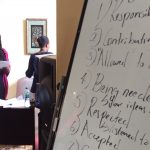 Next Post
Next Post